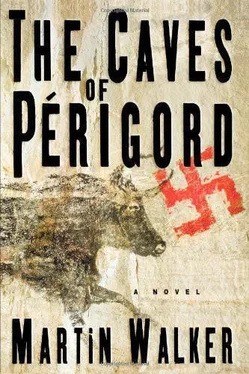Martin Walker - The Caves of Perigord
Здесь есть возможность читать онлайн «Martin Walker - The Caves of Perigord» весь текст электронной книги совершенно бесплатно (целиком полную версию без сокращений). В некоторых случаях можно слушать аудио, скачать через торрент в формате fb2 и присутствует краткое содержание. Жанр: Триллер, на английском языке. Описание произведения, (предисловие) а так же отзывы посетителей доступны на портале библиотеки ЛибКат.
- Название:The Caves of Perigord
- Автор:
- Жанр:
- Год:неизвестен
- ISBN:нет данных
- Рейтинг книги:4 / 5. Голосов: 1
-
Избранное:Добавить в избранное
- Отзывы:
-
Ваша оценка:
- 80
- 1
- 2
- 3
- 4
- 5
The Caves of Perigord: краткое содержание, описание и аннотация
Предлагаем к чтению аннотацию, описание, краткое содержание или предисловие (зависит от того, что написал сам автор книги «The Caves of Perigord»). Если вы не нашли необходимую информацию о книге — напишите в комментариях, мы постараемся отыскать её.
The Caves of Perigord — читать онлайн бесплатно полную книгу (весь текст) целиком
Ниже представлен текст книги, разбитый по страницам. Система сохранения места последней прочитанной страницы, позволяет с удобством читать онлайн бесплатно книгу «The Caves of Perigord», без необходимости каждый раз заново искать на чём Вы остановились. Поставьте закладку, и сможете в любой момент перейти на страницу, на которой закончили чтение.
Интервал:
Закладка:
“Very well. It will give us a chance to ask him why his security chap has been sniffing round in our footsteps. And to see if he’s prepared to tell us about Marat and the hiding of the guns,” said Manners. “Do you have any plans today, Clothilde? Lydia and I rather thought of looking round la Ferrassie again, trying the far side of the road toward Cumont.”
“I have some museum work I must do, and a meeting with architects about the new building. But I’m rather more intrigued by Malrand asking us to see him again,” said Clothilde. “In the meantime, I had a call from my stepfather about the parachute drop at Cumont, the one the Germans ambushed. He did an oral history project with the children at his school, getting them to interview all their relatives about their memories of the Resistance. He used some of it in his book. Something was jogging his mind, so he went back to the papers they had written, and pulled out two. I went to get them, had them photocopied, and here they are. They are very vague, but they might be significant. My mother sends you her warm regards, Lydia, and says she appreciated your delicacy yesterday.”
Lydia covered her embarrassment by reaching for the papers. She felt a touch of relief. She enjoyed bedtime romps, but chose them with such care and infrequency that she had never got accustomed to sharing breakfasts the next morning. Conversation the morning after so often seemed so forced and fraught with forbidding amounts of meaning that the occasion cried out for the distraction of a newspaper. In the bedroom when they woke, Manners had solved that problem in the most satisfying way. But now over coffee, and feeling a little shy about her own emotions for the man and nervously hopeful that this affair would last, she was glad of the prospect of some work.
The photocopies were of the small cahiers -notebooks-of graphed paper that French schoolchildren use, in the neat round handwriting that used to be standard. It was the handwriting that Clothilde still used, neat and legible. They took one sheaf each. Lydia’s was from a girl called Margueritte Perusin, and she began to read.
My brother Jeannot was sixteen years old when I was born, and he was the member of my family who fought with the Resistance even though he was very young. He helped with the parachute drops that came from England and America. Because our family has a farm, Jeannot was very good with horses. My mother says that Jeannot was away all night at one parachute drop near Cumont just before the invasion at Normandy when the German soldiers came to shoot the Resistance fighters and the horses they used. The Germans were very cruel. Jeannot came back home in the middle of the night to take our horses so that he and his friends could move the carts and take the English guns away. Jeannot went to la Ferrassie, but there was only one cart and it was empty because the guns had been hidden in a cave by the Englishman who was called “
capitaine
.” Jeannot was frightened of the Englishman who was very fierce. Jeannot took the carts away to hide them, my mother said. My father said that he was very cross with Jeannot when he came back because he was frightened we would lose the horses. But Jeannot had boasted that the work was very important to the war. They now had special guns that could shoot at the German tanks, and when the invasion came Jeannot went off to fight the tanks. Jeannot said the Englishman had taught him how to fight tanks, and how to fight Germans. They had to be as cruel as the Germans to make them angry so they would not think clearly and charge into ambushes. My mother said Jeannot cried once when he came back because of the bad things he had done to some Germans to make them angry. Jeannot stayed away all that summer and autumn, and came back on leave in a French uniform and went back to join General Leclerc’s Free French Army. He was wounded in 1945 in the fighting at Strasbourg, and then stayed in the Army after the war and was killed in Vietnam. He sent me a paper fan from Saigon. I only saw him when he came home on leaves and never knew why my mother and father still call him Little Jeannot, because he was very big and very nice to me. My mother cried when we learned that he had been killed at Hanoi. Jeannot was very brave and fought and died for France and we have his medal at home.
She passed Margueritte’s essay across the table to Manners and picked up the one he had read before she realized that he was staring intently at her. Or was it lovingly? Staring as if he were fascinated. So he should be, the dear man.
“You have astounding powers of concentration,” he said.
“Do I, darling?”
His eyebrows lifted. “That’s a lovely word when you use it to me. I hate it normally. It sounds like actresses and old-fashioned drawing room plays.”
“I’m very particular about the D word,” she said, putting her hand on his. “I didn’t plan to use it. I suppose it slipped out because I meant it.”
“I’m feeling ridiculously happy,” he smiled. “Tired and spent and full of energy and capable of anything.”
“Anything?” she laughed. “Oh good. It was a delicious night, Manners. Or do I mean a lubricious one? Anyway, I’m looking forward to another, and another. But in the meantime, we have work to do. Order us some more coffee and read this sad story about Little Jeannot.”
Young Claude Mourresac had written:
My uncle Pierrot was in the
Chasseurs Alpins
before the war, and fought the Italians when they invaded in 1940. He was not made a prisoner of war in Germany and he joined the Resistance of the
Armee Secrete
very early, even before the Germans occupied the Perigord. He was in the
Groupe Berger
and blew up trains with plastique explosive that an Englishman showed him how to use, and an American whose hair only grew in the middle of his head. They called him the Red Indian. The Englishman had a special razor called a Rolls-Royce that kept itself always sharp. This made my uncle very jealous because there were never any razor blades. The only time he saw the Englishman really angry was when the Red Indian stole his razor to cut his hair. They lived in caves and in the woods because the Germans wanted to kill them for blowing up trains. There were some Russians fighting for the Germans, which my father, Pierrot’s brother, could not understand because the Russians were supposed to be fighting the Germans in Russia. There were also some North Africans fighting for the Germans, who burned the farm next to ours, although it was our farm that was supplying most of the food to Pierrot’s group. We kept extra chickens and pigs in the woods that were not counted by the men from the Prefecture who came to count all our fields and livestock and tell us how much food we had to provide each week. The Resistance got their guns by parachute from London, and had special radios to talk to the pilots of the planes and to London. My father was allowed to hear the radio one night when General de Gaulle said it was time for all Frenchmen to rise and fight the Germans. My father built a windmill to get electricity to listen to the radio, but the wind was either too weak or too strong and one night it blew down. My father had been helping with the parachute drops, even though our farm would have been burned had the Germans known. There was one night when the Germans attacked a parachute drop and killed several Resistance men, but my uncle and the Englishman and the famous writer Francois Malrand got the guns away and hid them in a cave. Later some Communists tried to steal the guns, and my uncle told my father that the Communists were not true Frenchmen and he would have to fight them after he won the war against the Germans. My uncle was killed in the month after the invasion when the Germans sent tanks to recapture the liberated Perigord. He died for France and we are very proud of him and will never forget him.
Читать дальшеИнтервал:
Закладка:
Похожие книги на «The Caves of Perigord»
Представляем Вашему вниманию похожие книги на «The Caves of Perigord» списком для выбора. Мы отобрали схожую по названию и смыслу литературу в надежде предоставить читателям больше вариантов отыскать новые, интересные, ещё непрочитанные произведения.
Обсуждение, отзывы о книге «The Caves of Perigord» и просто собственные мнения читателей. Оставьте ваши комментарии, напишите, что Вы думаете о произведении, его смысле или главных героях. Укажите что конкретно понравилось, а что нет, и почему Вы так считаете.












